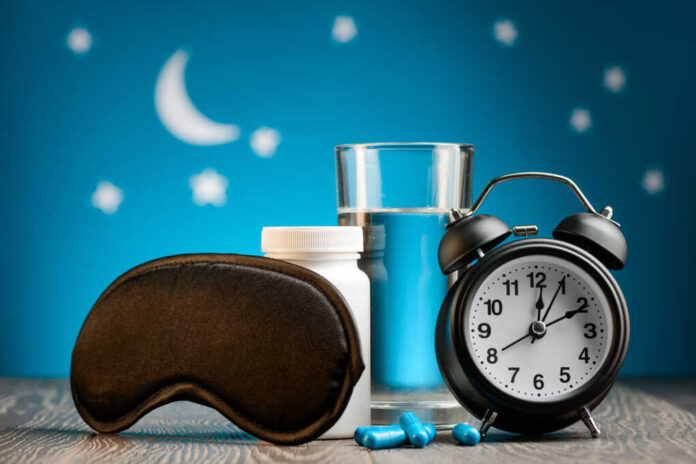
Natural sleep remedies combine herbal solutions with therapeutic practices to offer alternatives to pharmaceutical sleep aids, but their safety and efficacy require careful consideration before use.
At a Glance
- Herbal sleep aids like melatonin, valerian, and chamomile are popular alternatives, but their regulation differs from conventional medications
- The FDA does not evaluate the safety or effectiveness of dietary supplements before they reach consumers
- Mind-body practices such as meditation, yoga, and tai chi can significantly improve sleep quality without medication
- Lifestyle modifications including consistent sleep schedules and proper sleep environments are fundamental to addressing insomnia
- Consulting healthcare providers before starting any natural sleep remedy is essential to avoid interactions with medications
Understanding Herbal Sleep Remedies
The world of natural sleep solutions offers numerous options for those seeking alternatives to prescription sleep medications. Melatonin, a hormone naturally produced by the body, has become one of the most widely used supplements for sleep problems. Research indicates it can help reduce the time needed to fall asleep and may increase sleep duration. Valerian root, another popular remedy, has centuries of traditional use for insomnia and is officially recognized as a sleep aid in several European countries. Chamomile tea, passionflower, and ashwagandha are additional herbal options that many turn to for their potential calming effects.
This regulatory distinction is crucial for consumers to understand. Unlike prescription medications, manufacturers of dietary supplements don’t need to prove their products are safe or effective before selling them. The quality and potency of herbal remedies can vary significantly between brands and even between batches from the same manufacturer. Some supplements may also contain ingredients not listed on the label or in amounts different from what’s claimed, making informed choices challenging for consumers seeking relief from sleep troubles.
The Science Behind Natural Sleep Solutions
Research on herbal sleep remedies shows varying levels of evidence for effectiveness. Melatonin has the strongest scientific backing, with multiple studies supporting its use for certain sleep disorders and jet lag. The evidence for valerian is mixed, with some studies indicating benefits for sleep quality while others show no significant effect compared to placebo. Adaptogens like ashwagandha and rhodiola may help the body manage stress, indirectly improving sleep by lowering cortisol levels and easing anxiety that often contributes to insomnia.
Despite growing popularity, many herbal sleep aids lack large-scale, rigorous clinical trials to conclusively establish their safety profiles and efficacy. Some herbs can interact with medications or have side effects of their own. Kava, once promoted for anxiety and sleep, has been linked to liver damage, prompting warnings from health authorities. St. John’s Wort, sometimes used for depression-related sleep issues, can interact with numerous medications including antidepressants, blood thinners, and birth control pills, potentially reducing their effectiveness or causing adverse reactions.
Therapeutic Practices for Better Sleep
Beyond herbal remedies, various therapeutic practices have demonstrated benefits for sleep quality. Mindfulness meditation has gained recognition for reducing insomnia symptoms by calming the mind and reducing the racing thoughts that often prevent sleep. Regular practitioners report falling asleep more quickly and experiencing fewer nighttime awakenings. Yoga and tai chi combine gentle movement with breathing techniques, helping to reduce stress hormones and prepare the body for rest. These practices can be particularly beneficial for older adults struggling with age-related sleep changes.
Cognitive Behavioral Therapy for Insomnia (CBT-I) stands out as the most evidence-backed non-pharmaceutical approach to sleep problems. This structured program helps identify and replace thoughts and behaviors that cause or worsen sleep problems with habits that promote sound sleep. Unlike sleeping pills, CBT-I addresses the underlying causes of insomnia rather than just treating symptoms, and its benefits often persist long after treatment ends. Many health insurance plans now cover this therapy, recognizing its effectiveness for chronic sleep issues.
Lifestyle Foundations for Restful Sleep
The most effective approach to sleep problems often begins with foundational lifestyle practices rather than supplements or therapies. Maintaining a consistent sleep schedule—going to bed and rising at the same times daily, even on weekends—helps regulate the body’s internal clock. Creating a sleep-conducive environment with comfortable bedding, appropriate temperature (typically 65-68°F), and minimal light and noise provides the optimal conditions for quality rest. Limiting screen time before bed is particularly important, as the blue light emitted by phones and computers suppresses melatonin production.
Physical activity plays a crucial role in sleep quality, with regular exercise shown to reduce insomnia symptoms and increase sleep duration. However, timing matters—vigorous exercise close to bedtime may be stimulating rather than relaxing for some people. Dietary choices also influence sleep, with heavy meals, caffeine, and alcohol all potentially disrupting rest when consumed too close to bedtime. Instead, light snacks containing sleep-promoting nutrients like magnesium, tryptophan, or complex carbohydrates may help facilitate the transition to sleep for some individuals.
Sources:
https://www.webmd.com/women/natural-sleep-remedies
https://www.va.gov/WHOLEHEALTHLIBRARY/tools/botanical-medicines-healthy-sleep-rest.asp
https://pmc.ncbi.nlm.nih.gov/articles/PMC11321869/
https://www.healthline.com/health/healthy-sleep/insomnia-home-remedies
Natural Remedies for Sleep Disorders: Naturopathic Approaches to Better Sleep


















